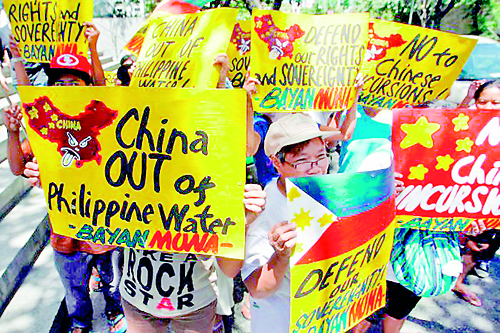Sunday Times 2
China aims South China Sea grab with fishing law: Philippines
View(s):MANILA, Jan 18 (AFP) -The Philippines Saturday said a Chinese rule requiring foreign fishing vessels to secure permission to enter much of the South China Sea was part of a long-term scheme to claim the entire body of water.
China’s southern island province of Hainan passed the rule in November and it took effect this year as tensions escalate over overlapping claims to the waters between China, the Philippines, Vietnam and other nations.
“The Hainan fisheries law is only one of the unilateral measures by China to force a change in the regional status quo in order to advance its… position of undisputed sovereignty over nearly the entire SCS (South China Sea),” Foreign Department spokesman Raul Hernandez said in a statement.

Tensions are boiling over between China and the Philippines in the South China Sea(Reuters)
The Philippines has been locked in an increasingly tense standoff with China involving disputed reefs and islands in the South China Sea, which Manila calls the West Philippine Sea.
China’s territorial claims over the South China Sea overlap those of the Philippines as well as Brunei, Malaysia, Vietnam and Taiwan.
Hernandez added that China’s claim to the entire South China Sea was in “gross violation of international law.
“It is the core issue that must be singularly and fully addressed,” he said, calling on China to agree to have the issue brought to an international arbitration tribunal.
“We reiterate our invitation to China to join us in arbitration as we intend to proceed with or without China for a final disposition,” he added.
The Philippines insists that Beijing’s so-called “nine-dash line” outlining its territorial claims over most of the South China Sea, including waters and islands close to its neighbours, is illegal.
It took its case to a tribunal last year under the United Nations Convention on the Law of the Sea — a 1982 treaty signed by both countries — but China swiftly dismissed the action.
Philippine Defence Secretary Voltaire Gazmin said this week that Filipino fishermen would ignore the Hainan rule.
The US State Department has called the introduction of the rule a “provocative and potentially dangerous act”.

